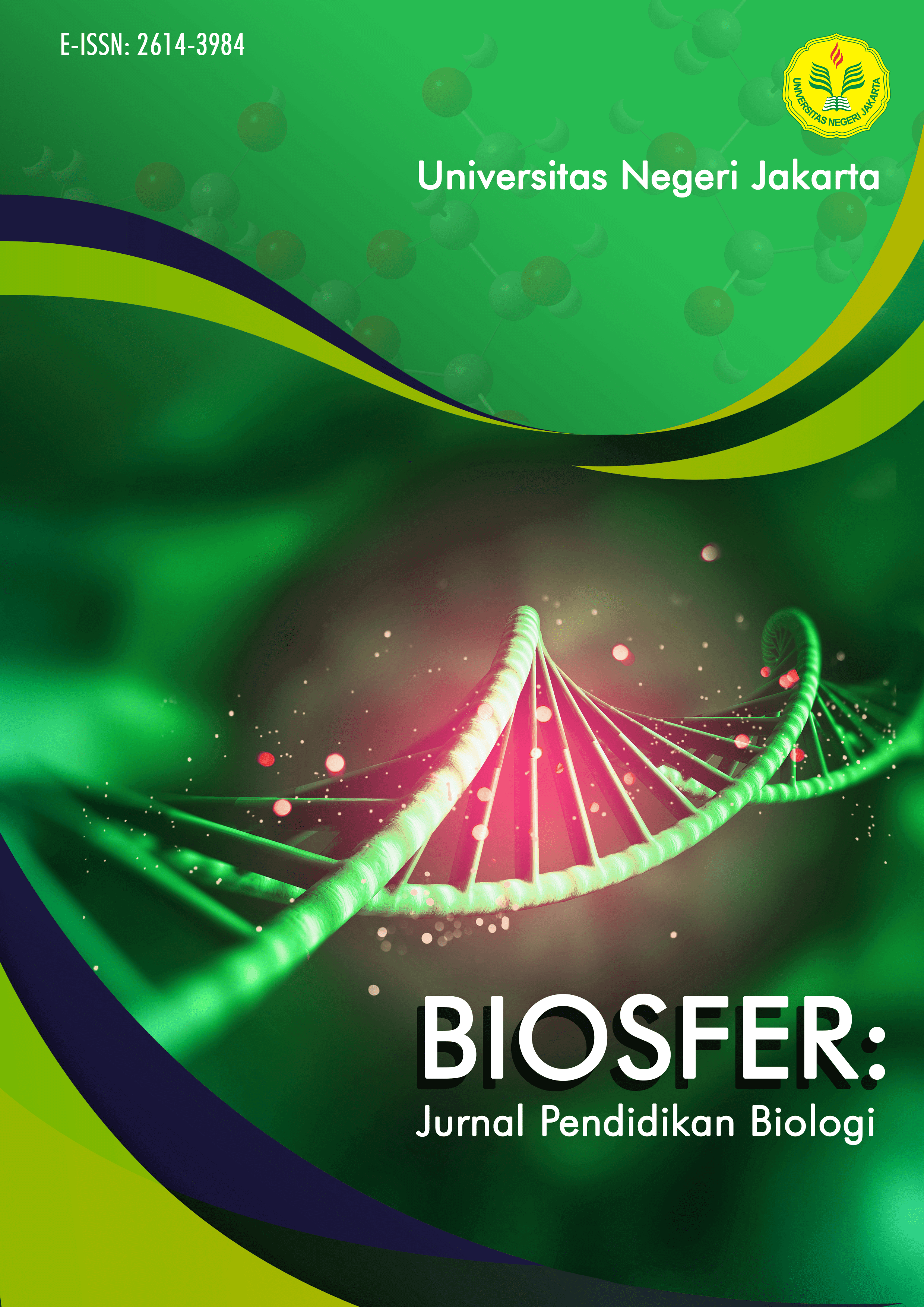Development of learning video on sub materials interaction in the ecosystem based on functional feeding group of macrobenthos
DOI:
https://doi.org/10.21009/biosferjpb.23832Keywords:
Development, feasibility, functional feeding group, interaction in the ecosystem, learning video mediaAbstract
Each organism has a different role as an integral part of an ecosystem. Nevertheless, this concept tends to be random and inaccurate in building a complete understanding of ecosystem interaction pattern. This research aims to develop learning video on ecosytem interaction, specifically on functional feeding group of macrobenthos. The feasibility of video as a learning medium was seen from five aspects of simplicity, audio, integration, balance, and effectiveness. The development of learning video is divided into two stages of the preliminary and the formative evaluation stage. In the preliminary stage, a field survey was conducted in the examples of interaction forms presented in 3 commonly used Biology textbooks. The formative evaluation stage was conducted to test the effectiveness of the learning product through self-evaluation and expert review. 5 validators of 2 lecturers and 3 high school biology teachers were assign. Data analysis was done with Lawshe method. An ICC (Interclass Correlation Coefficient) reliability test was carried out to determine the reliability of the validation instrument. The results of the reliability test using the ICC yielded an ICC value of 0.758 which puts it in the excellent category. All criteria from the aspects of the learning video media validation sheet are declared valid with CVR and CVI values of 1. Therefore, this learning video can be considered valid to be tested in limited trials.
References
Andriani, T. (2015). Sistem Pembelajaran Berbasis Teknologi Informasi dan Komunikasi. Sosial Budaya: Media Komunikasi Ilmu-Ilmu Sosial dan Budaya, 12 (127–150). https://ejournal.uin-suska.ac.id/index.php/SosialBudaya/article/view/1930
Ardi. (2002). Pemanfaatan Makrobentos Sebagai Indikator Kualitas Perairan Pesisir. Bogor: Institut Pertanian Bogor.
Arikunto, S. (2010). Prosedur Penelitian Suatu Praktik. Jakarta: Rineka Cipta.
Arsyad, A. (2013). Media Pembelajaran. Jakarta: PT. Raja Grafindo Persada.
Asyhar, R. (2012). Kreatif Mengembangkan Media Pembelajaran. Jakarta: Gaung Persada (GP) Press.
Baidlowi, M. H., Sunarmi, & Sulisetijono. (2019). Biosfer : Jurnal Pendidikan Biologi. Biosfer: Jurnal Pendidikan Biologi, 10(2), 57–65.
Guswiani, W., Darmawan, D., Hamdani, N. A., & Noordyana, M. A. (2018). Efektivitas Penggunaan Video Pembelajaran Dalam Pembelajaran Front Office Di Kelas XI Akomodasi. JTEP-Jurnal Teknologi Pendidikan Dan Pembelajaran, 3(September), 688–698. https://journal.institutpendidikan.ac.id/index.php/tekp/article/view/416
Hamid, M. A. Ramadhani, R., Juliana, M., Safitri, M., Munsarif, M., Jamaludin, Simarmata, J. (2020). Media Pembelajaran. Medan: Yayasan Kita Menulis.
Hartono, B. (2016). Dasar-dasar Kajian Buku Teks: Konsep Dasar, Pemilihan, Pemanfaatan, Penilaian, dan Pengembangan Materi Ajarnya. Semarang: UNNES PRESS.
Lawshe, C. H. (1975). A Quantitative Approach to Content Validity. Journal of Personnel Psychology, 563–575. https://doi.org/10.1111/j.1744-6570.1975.tb01393.x
Manzilina, F., Listiawati, E., & Wijayanti, R. (2020). Pengembangan Media Videoscribe Pada Materi Sistem Persamaan Linier Dua Variabel (Spldv). JIPMat, 5(2), 185–199. https://doi.org/10.26877/jipmat.v5i2.6624
Musfiqon, H. M. (2012). Pengembangan Media dan Sumber Pembelajaran. Jakarta: Prestasi Jakarta Publisher.
Niswa, A. (2012). Pengembangan Bahan Ajar Mendengarkan Berbasis Video Interaktif Bermedia Flash Kelas VII D SMP Negeri 1 Kedamean. Jurnal Bahasa Dan Sastra Indonesia, 01(01). https://ejournal.unesa.ac.id/index.php/bapala/article/view/2019
Odum. (1994). Dasar-dasar Ekologi (Ketiga). Yogyakarta: Universitas Gajah Mada Press.
Pearson K. (1901). On lines and planes of closest fit to systems of points in space. Philosophical Magazine, 2, 559–572. https://doi.org/10.1080/14786440109462720
Praheto, B. E., Andayani, Rohmadi, M., & Wardani, N. E. (2017). Peran Multimedia Interaktif Dalam Pembelajaran Keterampilan Berbahasa Indonesia Di PGSD. The 1st Education and Language International Conference Proceedings Center for International Language Development of Unissula (ELIC 2017), 173–177. Retrieved from http://jurnal.unissula.ac.id/index.php/ELIC/article/view/1224
Riyana, C. (2007). Pedoman Pengembangan Media Video. Jakarta: P3AI, UPI.
Rosyid, M. Z., Sa’diyah, H., & Septiana, N. (2019). Ragam Media Pembelajaran (I; M. P. Taufikurrahman, ed.). Malang: CV. Literasi Nusantara Abadi.
Sadiman, A., Rahardjo, R., Haryono, A., & H. (2014). Media Pendidikan. Jakarta: PT Rajagrafindo Persada.
Sanaky, A. H. (2013). Media Pembelajaran Interaktif-Inovatif. Yogyakarta: Kaukaban Dipantara.
Tarigan, D., & Siagian, S. (2015). Pengembangan Media Pembelajaran Interaktif Pada Pembelajaran Ekonomi. Jurnal Teknologi Informasi & Komunikasi Dalam Pendidikan, 2(2), 187–200. https://doi.org/10.24114/jtikp.v2i2.3295
Wibawanto, W. (2017). Desain dan Pemrograman Multimedia Pembelajaran Interaktif (1st ed.; D. Febiharsa, ed.). Jember: Penerbit Cerdas Ulet Kreatif. Retrieved from http://lib.unsub.ac.id/index.php?p=show_detail&id=4740
Zaki, R. (2017). Validation of Instrument Measuring Continuous Variable in Medicine. In Advances in Statistical Methodologies and Their Application to Real Problems. https://doi.org/10.5772/66151
Downloads
Published
How to Cite
Issue
Section
License
The Authors submitting a manuscript do so on the understanding that if accepted for publication, copyright of the article shall be assigned to Biosfer: Jurnal Pendidikan Biologi (Biosferjpb) and Departement of Biology Education, Universitas Negeri Jakarta as publisher of the journal.



